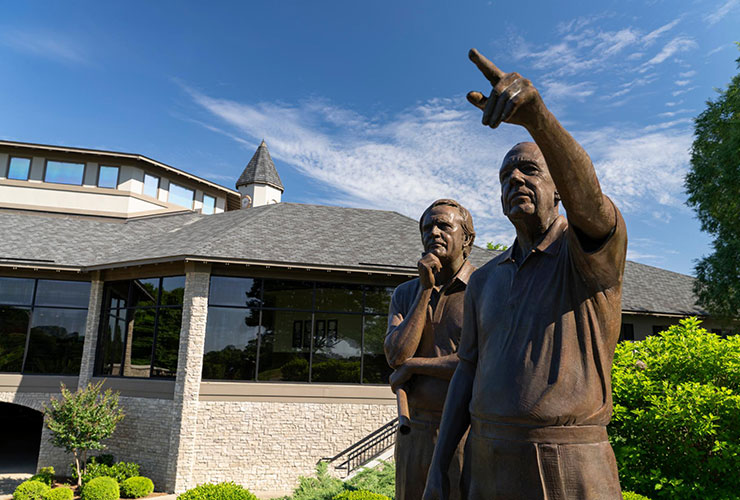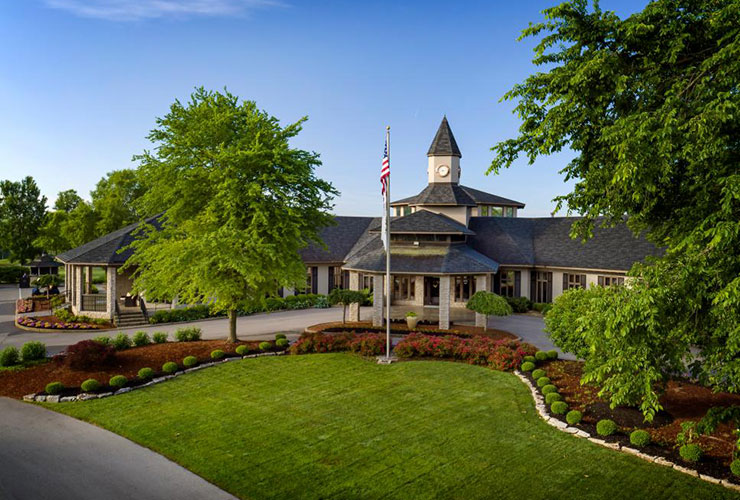Valhalla Golf Club
John Berry figures he has walked every inch of Valhalla Golf Club and played as many as 1,000 rounds in his 35 years as a member. And, he says, he will never return.
Valhalla members of long standing were told in November to surrender their rights to the refund of initiation fees or lose their membership, as of January 1, 2023, in Louisville’s most prominent club, the host of three majors and a Ryder Cup. Simultaneously, management eliminated corporate memberships and prohibited guests unaccompanied by a member.
What Valhalla’s new ownership has characterised as an effort to streamline multiple levels of membership into a single class — preferably those with “skin in the game” — has been a source of turmoil and turnover at a club due to stage its fourth PGA Championship in 2024. Some of the club’s most senior members have resigned, believing they’ve been betrayed by local owners who have promised improvements but made the relinquishing of refund rights a condition of continued membership.
“My wife told me: ‘Just give them the money. You love golf,’” said Berry, a Louisville attorney. “I said: ‘No, it’s not about the money.’ You don’t treat somebody like this. I’m not going to let somebody treat me like this and shake [their] hand and say: ‘Please sir, may I have another?’”
Those members who joined Valhalla prior to 2014 did so with the understanding they would receive a refund of some or all of their initiation fee upon leaving the club. A “Club Profile” distributed to members in 2003 cites a standard refund rate of 70 per cent of an incoming member’s initiation fee. Phil Gahm, son of Valhalla founder Dwight Gahm, said founding members were eligible for a 100 per cent refund.
But after completing the purchase of the club from the PGA of America last June, Isco Industries CEO Jimmy Kirchdorfer and his three partners sought to eliminate a liability estimated between $4 million and $5 million, first by seeking a voluntary surrender of refund rights, later by issuing what was widely interpreted as an ultimatum.
“It’s insane. I don’t need the money. I don’t care about the money. I had to take a stand against these guys.”
Former Valhalla member Tim Graven
As Tim Graven, former president of Steel Technologies, put it: “Give up your equity or hit the road. We’re done with you.”
“It’s insane,” Graven said. “I don’t need the money. I don’t care about the money. I had to take a stand against these guys.
“I love Valhalla. It’s my happy place in life, it really is, and they ruined it. … I told them when they called me [to ask]: ‘Are you leaving?’ ‘Yeah, I’m leaving because you’re not going to do the things we want done and you’re pompous and arrogant and the way you treat people is ridiculous. And I’m not going to be bullied into staying.’”
Valhalla management declined to say how many members have departed the club or how many new members have been admitted since ownership said it was “at capacity” in an e-mail to members last October. But Graven said a club executive told him the number of members who have left was in the “mid-40s,” including those members eligible for initiation-fee refunds, corporate members who chose not to reclassify and the predictable group of aging golfers who had come to find the course too difficult.
“I didn’t care for the direction they were going,” said Steve Humphrey, who had been a member since 1995. “The feeling was they wanted to turn Valhalla into a sort of Augusta. I don’t want it to be a showplace. For me, it’s just a golf club.”
Kirchdorfer and his partners — former NBA star Junior Bridgeman, hotelier Chester Musselman and former Yum Brands CEO David Novak — bought Valhalla with the announced intention of returning the club to local ownership “to protect Valhalla from profit-driven investors, who would likely develop the critical land surrounding our course”, while committing to personally fund clubhouse renovations and other improvements.
“No funds from member dues will be used for these projects,” members were told in the October 31, 2022, email. “We did not acquire the club with the intent of making money, but to protect and preserve this iconic Louisville property.”

The 18th hole at Valhalla Golf Club. Gary Kellner
Still, in convincing most of its long-time members to waive their refund rights, the partners reduced their future costs by multiple millions of dollars. Several former members said they suspect ownership of “double-dipping” — negotiating a lower purchase price based on liabilities that it was later able to off-load. The PGA of America declined to comment on whether initiation fee refund obligations had influenced the club’s sale price, listed on a June 1, 2022, deed at $12.4 million.
According to the Jefferson County Property Value Administration, that price reflects only the value of Valhalla’s land parcels. Former member Terry Meiners says Musselman told him in December the full price of acquiring the property was $23.5 million.
“Every great club must eventually be able to stand on its own,” the new owners told membership in October. “To do this, the operating expenses must be funded by the member dues and other daily revenue. All capital requirements must then be funded from initiation fees. Valhalla has never been successful at this model, and we are taking steps now to resolve these issues, to ensure the longevity of the club.”
Graven suspects ownership’s business plan was to replace refund-eligible members with new members prepared to pay higher fees. Valhalla declined to disclose its current fee structure, but Meiners said one of his neighbors passed on a membership pitch from Kirchdorfer at $65,000.
“The PGA worked with us,” Graven said. “These guys are not interested in that. It’s their club and if you don’t like it, get the hell out. ‘We’ll find 30 members to fill all of your spots and they’ll pay $100,000.’ They were blatant about it. I got to thinking about it and, you know, this may be time for me to leave.”
Despite the defections, Valhalla General Manager Keith Reese says he cannot remember as much interest in joining the club or as extensive a list of member nominees in his 33 years there. Though Valhalla’s recent experience may be more turbulent than that of most clubs, it continues to benefit from a nationwide golf boom and its cachet as the site of major championships.
While some long-time Valhalla members privately grumbled about the cost of reclassifying, the vast majority of those eligible for refunds agreed to remain. Some weighed the cost of surrendering their refund rights against the expense of joining another and arguably less prestigious club. Others expressed enthusiasm for new ownership’s investment and its vision for a “firm, fast and fun on-course experience”.
“I will say on the record I’m really happy with the change of ownership in that it’s a members-first club. To me, the story is the renaissance of the club. Not that it was bad before, but it’s going to be really good now.”
Mark Switow, a Valhalla member for 28 years
“I’m a numbers guy,” said wealth management executive Mark Switow, now in his 28th year as a Valhalla member. “That’s what I do for a living. There were over 140 people that were impacted by this and 120-some out of 140 said yes. A lot of people opted to stay in, and a few people opted out …
“I will say on the record I’m really happy with the change of ownership, in that it’s a members-first club. To me, the story is the renaissance of the club. Not that it was bad before, but it’s going to be really good now.”
Kirchdorfer, who responded in writing to questions submitted by Golf Digest, says those members who have resigned and were eligible for refunds have been paid in accordance with their membership agreements and club bylaws, and that “any attempt to portray former members as having been treated unfairly or ungraciously would be misleading.”

The 13th at Valhalla is one of the course’s signature holes. Gary Kellner
Nonetheless, hard feelings persist.
“People who want to play Valhalla are going to take a punch in the face to continue that practice,” Meiners said. “For me, I love a lot of golf courses in this community. I’ll play elsewhere.
“I stewed on it for several weeks. I just didn’t like the tenor of the ultimatum. I’ve spent probably half a million dollars at Valhalla over the last two decades and I don’t think you should treat a customer that way.”
Meiners, a prominent radio and television personality in the Louisville market, said he paid $45,000 to join Valhalla in 2003. Once he quit, and consistent with the terms in place at the time he joined, he received a cheque dated December 29, 2022, for $33,250, or 70 percent of $47,500. Meiners does not dispute the amount of the payment, but rather the circumstances that forced him to choose between cashing out and remaining a member.
“The thing about Valhalla is a basic rule of life: A deal is a deal,” he said. “I expect to be honoured with the conditions of the original deal [to leave on his own timetable]. Golf is a game of honour and integrity. The Valhalla equity ultimatum could be interpreted as ignoring both principles.”
The conflict is at least unusual and possibly unprecedented. Two attorneys who have tried recent membership cases against private clubs in Florida and New Jersey, Ben Christian and Gary Graifman, were unable to identify a membership issue analogous to Valhalla’s. Asked if it was aware of a similar case, Valhalla management’s written response did not cite any examples.
“Every club is structured differently,” the club said. “All actions on behalf of Valhalla are consistent with the membership agreement and bylaws of the club for almost 30 years.”
Valhalla’s bylaws clearly state a member “acquires only a non-exclusive, revocable license to use the club facilities”; that the club reserves the right to issue or terminate some or all of the memberships, and to make any other changes in terms and conditions of membership.
These policies are consistent with those of many private clubs across America and with the latitude they have been allowed by US courts, but the position taken by Valhalla’s owners regarding initiation fee refunds appears to be an outlier. Perhaps the closest parallel was a 2014 edict by Scottsdale National Golf Club owner Bob Parsons, the billionaire founder of GoDaddy and later Parsons Xtreme Golf (PXG), who imposed new rules designed to have members play less and spend more while offering a full refund of initiation fees to those unwilling to comply.
“During any period of change and transition within a large organisation, whether a company, non-profit or private organisations, there are always some individuals not entirely in agreement with those changes,” Kirchdorfer said. “This is, of course, understandable and the former members who exited the club, for whatever reason, were refunded their initiation fee per their membership agreement and club bylaws.
“As for any rationale behind some of these changes, I can tell you that we always strive to make decisions that are not only best for Valhalla, its members, the golf and civic organisations we support, but also the club’s important place in the heritage of the game here in Kentucky and beyond. Simply put, we believe Valhalla is too special to be stewarded by people not 100 per cent committed to its rich legacy and bright future.”
Kirchdorfer cites the planned launch of a Valhalla Charitable Foundation and youth caddie programme as evidence of ownership’s interest in making golf more inclusive and accessible in Kentucky. Among the new policies he has implemented is one that provides members’ spouses and children under 23 full club privileges at no additional cost.
Opened in 1986, Valhalla’s relatively brief history includes three PGA Championships — the last two won by Tiger Woods in 2000 and Rory McIlroy in 2014 — and the 2008 Ryder Cup, captured by the US team. Only Wisconsin’s Whistling Straits has also held three PGA Championships and a Ryder Cup during that same span.
Long before the club was sold, former PGA of America President Ted Bishop suggested an “out-of-the-box” idea for Valhalla to become the permanent site of the PGA Championship and all domestic Ryder Cup matches. Whether Valhalla can continue to attract major championships on a regular basis now that the PGA of America has sold the club and moved its headquarters to Texas is unclear, but Meiners still refers to the course as “golf’s holy altar in Kentucky”.
Former University of Kentucky basketball star Jimmy Dan Conner laments the discord that has developed but was so intent on encouraging local stewardship of Valhalla that he volunteered to waive his refund rights even before Kirchdorfer and Company put an offer on the table.
“I wasn’t trying to set precedent for anybody else,” Conner said. “But it meant something for me, and I think it was good for the community if we were fortunate enough to get local ownership. The only thing I said was: ‘I’m going to put my money where my mouth is. I’m going to give my equity up.’ I certainly didn’t think that would be a policy, (but) I felt that strong.”

Valhalla founder Dwight Gahm and designer Jack Nicklaus are represented with life-sized bronze statues outside the Valhalla clubhouse. Gary Kellner
Phil Gahm, whose father Dwight sold Valhalla to the PGA of America in 2000, says he willingly waived his founders’ rights to retain a link to his family’s legacy. Life-size bronze statues of Dwight Gahm pointing and Nicklaus pondering stand behind Valhalla’s 18th green.
“It was a no-brainer for me to give up my founder privileges and remain a member of Valhalla because I was on board from Day 1, my family started the club, and I’m going to be supportive,” Phil Gahm said. “I’m 100 per cent behind them. If you had had a private equity firm that Jimmy [Kirchdorfer] was competing against, they would have done the same thing. … It’s probably what any third-generation owner would have brought up.”
Gahm said he encouraged Kirchdorfer to seek a compromise to prevent the exodus of long-time members, but Valhalla’s new policies proved to be inflexible. John Berry said he proposed ceding half of his refund rights to the club to demonstrate “skin in the game”, and Meiners offered to surrender his refund rights if the amount was applied to his annual dues. Both men were rebuffed.
“I didn’t sleep for a whole month,” Berry said. “I’m still having a hard time putting this behind me. I’ve got a bad taste in my mouth. I’ll always have it.
“It’ll haunt me. It’ll haunt me till the day I die.”









